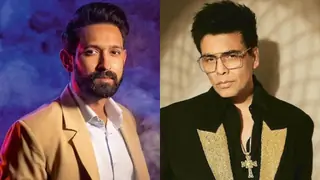Andhera Review: From Spine-Tingling Start to Chaotic Finish in Mumbai’s Darkest Corners
Andhera starts eerie and gripping, but cluttered subplots and forced romances dim its impact, ending as an ambitious yet uneven watch.
Published: Wednesday,Aug 13, 2025 19:10 PM GMT-06:00

A Darkness That Promised More

Mumbai is a city of light, but also of shadows. Andhera leans into that duality from the very first scene. The city’s neon gleam is broken by corridors dimly lit, by flickers of faulty tube lights, and by the quiet hum of something unseen. At the center of this unease is Bani Baruah, a 24-year-old battling bipolar disorder, whose mysterious fall from a hotel window sparks a chain of events far more sinister than a simple missing-person case.
That night she crosses paths with Andhera, a force that isn’t just evil, but alive. From there, the darkness seeps into the lives of Jay Sheth (Karanvir Malhotra) and his brother Prithvi (Pranay Pachauri). An accident puts Prithvi in a coma, and Jay, plagued by visions, turns to Rumi (Prajakta Koli), a paranormal vlogger whose “Unseen Supernatural Club” has seen it all or so she thinks. As the three of them dig deeper, Inspector Kalpana Kadam (Priya Bapat) joins the fight, her sharp instincts battling not just the supernatural, but also the casual sexism of her male superiors who joke about her “talking skills” rather than her investigative grit.
When Atmosphere Works Better Than Story

In its early episodes, Andhera thrives on mood. The sound design is immersive, moments of complete silence cut by sudden metallic clangs, the drip of a tap amplified into menace. Shadows stretch and swallow hallways, while Mumbai itself becomes a character, alternating between suffocating crowds and eerie stillness. These sequences give the impression that you might be seeing things, just as the characters do.
But the further the show goes, the more that mood is pushed aside in favor of spectacle. What begins as an unnerving, slow-burn psychological thriller turns into a jarring mix of horror tropes and comic-book-style confrontations. The deliberate pacing of the first four episodes is replaced by a rush to cram in mythology, action, and new subplots, leaving the tension in tatters.
Writing and Direction – Ambition That Overreached

The creators, Karmanya Ahuja, Karan Anshuman, Raaghav Dar, Gaurav Desai, Akshat Ghildial, and Chintan Sard set out to build a layered horror narrative, rooted in the concept of immortality and psychic connections. The ambition is undeniable. But instead of letting the mystery breathe, the screenplay tries to keep escalating, adding so many elements that it loses focus.
Director Raaghav Dar shows early control over pacing and visual tension, but the discipline falters as the series progresses. Key characters disappear and reappear without explanation, pivotal twists arrive without the emotional buildup they need, and certain plot turns feel almost absurd. By the time the finale hits, with its CGI-heavy supernatural battles and a Marvel-like makeover for Surveen Chawla’s character, the subtle creepiness of the beginning feels like a distant memory.
Performances – A Game of Uneven Shadows

Karanvir Malhotra delivers intensity as Jay, but his portrayal of a man grappling with depression and fear remains surface-level. Pranay Pachauri’s Prithvi is compelling in the moments he gets, but his absence for much of the story due to the coma is a missed opportunity. Prajakta Koli’s Rumi fits her real-life persona as a content creator so well that it borders on predictable, effective, but not surprising.
The standout is Priya Bapat as Inspector Kadam, balancing vulnerability and authority in a way that grounds the chaos. Surveen Chawla’s Ayesha has potential, especially in her romantic subplot with Kadam, but the relationship is underwritten and never quite believable. Vatsal Sheth’s Darius, set up as a major player, ends up sidelined into little more than a henchman, while Praveen Dabas makes a quiet impact as Dr. Sahay despite limited screentime.
The Final Fade to Black

Technically, Andhera starts strong. Lighting, framing, and sound design work together to make the darkness feel tangible. But repetition dulls the effect, and as the show leans more on visual effects in the later episodes, the fear factor diminishes. Editing in the final stretch feels rushed, as though scrambling to tie up too many dangling threads.

The romantic subplots in Andhera are a mixed bag. Inspector Kadam and Ayesha share an unexpected LGBTQ angle, a trope streaming platforms seem determined to include these days, often without purpose. Here, at least, the chemistry is genuine, their shared moments natural enough to make you believe in their bond. On the flip side, Jay and Rumi’s sudden shift from platonic partners in a paranormal quest to kissing couple feels abrupt, almost as if it was checked off a list. It’s these love angles, wedged into an already crowded storyline, that dilute the urgency of the core horror and mystery threads.
Another dangling thread is the Aatma Healing Centre, introduced with intrigue but abandoned without payoff. Its connection to the central plot is hinted at, even teased as a possible key to the supernatural mystery, but never explored beyond surface level. The result is a subplot that feels like an unfinished thought, a fragment of a bigger idea that never made it past the draft stage. In a story already juggling too many elements, leaving such arcs unresolved only adds to the sense of incompleteness that creeps in by the final episodes.
The Verdict

And that’s the real tragedy here, Andhera could have been a genre-defining urban horror for Indian streaming. It had the setting, the atmosphere, and the seed of an intriguing concept. But in trying to outdo itself with every episode, it trips over its own ambition. By the end, what lingers isn’t the fear it promised, but the sense of what could have been if it had trusted its own shadows.
Andhera begins as a chilling urban horror set in Mumbai, weaving supernatural dread with psychological mystery. Strong atmosphere, sound design, and Priya Bapat’s performance shine, but the story soon spirals into cluttered subplots, forced romances, and unresolved threads. Despite flashes of brilliance, overcomplication robs the finale of impact, leaving it an ambitious but uneven watch.
Join Our WhatsApp Channel
Stay updated with the latest news, gossip, and hot discussions. Be a part of our WhatsApp family now!
Join NowYour reaction
 Nice
Nice Great
Great Loved
Loved LOL
LOL OMG
OMG Cry
Cry Fail
Fail






















Post a comment